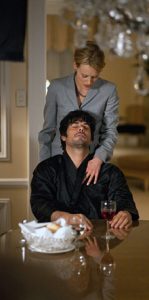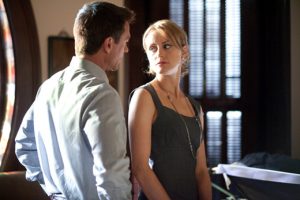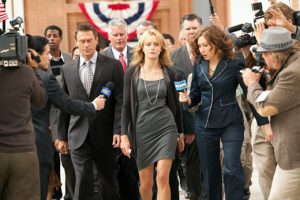BY JUDD WEISS
Some of us weren’t just skeptical about the new Atlas Shrugged movie; we wanted it stopped. There’s no way a rushed, small-budget, independent production could do justice to Ayn Rand’s novel. Or could it?
A few weeks ago, at a private screening for Atlas Shrugged Part 1, I took my seat, closed my eyes, dropped my head, and for the first time in my life, I said a prayer. “Please don’t be cheese ball. Please don’t be cheese ball. Please don’t be cheese ball.”
A vision flashed in my mind of John Travolta, on the cover of a Battlefield Earth poster. Petrified, my fingers hardened into a grip around my arm rests. “No! Please don’t be cheese ball. Please don’t be cheese ball….”
No doubt, the excitement in the room was mixed with fear. The producers of this film had the balls to make a motion picture out of one of the most thought provoking and controversial novels of all time. We know about the Library of Congress reader’s poll ranking Atlas Shrugged as the second most influential book of all time next to the Bible, and other prominent reader polls ranking it as the best novel ever written — over one thousand pages packed with action, philosophy, adventure, politics, romance, mystery, and a whole lot of attitude.
Ayn Rand nailed these 1300 pages on the door of the world’s churches and state capital buildings, sparking what history might record as the beginning of the next Renaissance.
Back in the 1500s, Martin Luther nailed his 95 Theses on the door of a prominent Catholic church, sparking The Reformation. Ayn Rand nailed these 1300 pages on the door of the world’s churches and state capital buildings, sparking what history might record as the beginning of the next Renaissance, the next cultural movement to bring back a focus on reality and reason and freedom and productivity.
The novel’s title refers to the Greek god Atlas, of course, who strains to hold the weight of the world on his shoulders. The load gets heavier and he struggles through blood and sweat to keep the world up. Until he changes his mind, shrugs, and drops the world. Let it fall. Let the world burn. Let all the ungrateful leeches and apes have it to themselves and enjoy it. Atlas is done.
The parallels to what is happening today are extraordinary. The achievers and producers are routinely blamed for the problems of the world. People have voted into office politicians intent on further regulating and controlling the producers in our country. More and more people are becoming “the needy” — and more mouths are opening. Amidst an economic crisis, the popular political solution is to demonize, and then to chain, the hands that feed us.

We can imagine what would happen to our quality of life if all the leaders of the vilified oil companies, pharmaceuticals, ISPs, and Zuckerberg, suddenly said “Screw you all — I’m out.”
Ayn Rand took a bold stand in support of those who produce and create. By taking this stand so firmly, she became one of the most widely revered and hated public figures of the last 100 years.
Everyone in the screening room with me knew the power of this book. And now, they’ve filmed this historical document. Actors and camera men and movie sets are going to bring it to life.
Terror strikes you harder when you know the circumstances surrounding its creation. For five decades, people have been struggling to make the movie. Over the years, many famous stars were attached to a wasteland of terrible scripts. Angelina Jolie made waves for being cast in the lead role a few years ago, but then she got pregnant, or something like that, and that production attempt died a bitter death.
The newest option on the film rights to Atlas Shrugged were set to expire in June of last year, 2010. In April, John Aglialoro, the producer who held the option on the film rights, begged for the rights to be extended, but was denied.
This meant he had two months to start production — or lose the millions he already invested in the project over the years. That meant two months to get a new script together, get the financing together, get the available cast together, choose a director, find film locations, and all that other stuff, while attempting to faithfully and successfully adapt a deep, complex, legendary novel for the screen.
Fans were pissed! And I was one of them. You know, I always push people to take on tough challenges, not to give up when things get more difficult. But even I can acknowledge reality.

Not only is this impossible, but the producers are about to ruin one of the most important novels of all time. This book, profound and packed with so much insight and story, is about to get discredited and humiliated before the public. I didn’t believe.
I wanted this movie stopped. Word on the streets was this was going to be a train wreck.
In fact, along with many fans, I wanted this movie stopped. Word on the streets was this was going to be a train wreck. We all want to see this film made, but let’s take our time and do it right.
If I could have spoken with the producer, I would have said, “John, don’t do this. I know you don’t want to lose your money, but please don’t drag this classic down with you. Please let go and give up on this. It’s too important. You are about to cause a lot of damage and harm. There is no way for you to pull this off as a rush job.”

I was wrong.
Now, does this movie carry the same power as the novel? No man, there’s no way. A movie is just a visual representation — a graphic novel, if you will. Pictures and dialogue truly can not carry the weight of all that writing, but can only allude to it. And that’s the point. It seems obvious that this movie was never meant to replace the book, but rather to serve as a phenomenal advertisement for it.
The highlight of the film is its script, co-written by Aglialoro and Brian O’Toole.
The highlight of the film is its script, co-written by Aglialoro and Brian O’Toole. Witty and full of attitude, it successfully and faithfully adapts the novel to the screen. Part of what keeps this film enjoyable throughout is that you can hear Ayn Rand’s attitude shine through in the dialogue. The theme was well preserved: This is a war between creators and blood suckers.
Let’s get a few things out of the way. This was made for $10 Million. That’s a lot of money, but tiny, tiny for movie production. You’re not going to see Avatar production quality.
Directed by a TV director and starring a cast of TV actors, this is actually TV movie production quality, but very good TV movie quality. We have all seen excellent TV programs that we’ve enjoyed, so this is not meant as an aspersion. The filmmakers did an incredible job squeezing production value out of a small budget.

The production quality was saved by excellent cinematography. The man behind the camera was obviously catching up on his Dr. Zhivago, going for epic sweeping landscape shots that mark legendary director David Lean’s claim to excellence.
The worst acting was unfortunately from John Galt’s few scenes.
The acting was OK. They won’t win any Oscars, but they pulled it off. The worst acting was unfortunately from John Galt’s few scenes. He’s not even supposed to appear until the third part of the novel. I don’t have a problem with briefly introducing him in part one; it’s just that it wasn’t done so well. Fortunately he always appears in the dark and you could never really see him, so any better actor can easily take over that part in the future sequels.
By far my favorite actor was Grant Bowler. Perfectly cast as Henry Rearden, he truly exemplifies the strong, accomplished businessman bewildered as he’s surrounded by all the ungrateful bloodsuckers supported by him. Perhaps the best cast role was Rebecca Wisocky as Hank’s wife, Lillian Rearden. She did a fantastic job of playing a cold bitch, putting genuine terror deep into the heart of any man who’s not yet married. Well, at least she accomplished that for me. Seriously, check out that leaked scene of Rearden giving his wife a gift and tell me if you honestly still feel like ever getting married.
The film was about 100 minutes. It should have been a little longer. Even though this film represents only the first third of the book, there is still too much material to cover, even after editing down the story, and it caused the pacing to become very fast. Some scenes don’t have a chance to set in and build the gravity of the situation.
The truth is, the film is intelligent, it is engaging, it is faithful, and it is entertaining.
Perhaps this is where art meets reality. Three hours would have allowed for a lot less compromise, but that much film time would have required a bigger budget and more production time, and surely would restrict the distribution considerably, as theaters would be unable to rent as many seats. Still, it could have used another 20 minutes of film time.
So, the movie is not perfect. Screw it, I don’t care. Hardcore fans like us could find a million ways to pick apart the film and complain over details; but the truth is, the film is intelligent, it is engaging, it is faithful, and it is entertaining.
The movie is excellent as it stands, and the fact that John Aglialoro pulled this off and achieved this feat — well, that’s a story worthy of being among the pages of the novel itself. And it also opens up some ideas for fun exercise challenges to give the producer next time for the sequel. Apparently some of us work better under extreme pressure. Ok dude, you’ve got only one month this time, make it better. Go!
I kid.
John Aglialoro, my deepest apologies for my previous misgivings. I salute you, sir.
Judd Weiss lives in Los Angeles and blogs at HustleBear.com.
